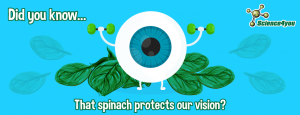
Did you know that spinach protects our vision?
Do you know how to protect your vision, little scientist? The health of our eyes is largely dependent on how we take care of them over the course of our lives. This includes eating foods that are beneficial to eye health.
Spinach Eye Benefits
Eating spinach is one of the ways to protect our eye vision. It is has a long history of having major health benefits. Where would Popeye be without his spinach? Spinach is known for its high fiber content and its amount of antioxidants and vitamins that researchers have shown might decrease the risk of stroke and developing cataracts. The green leaf that gave Popeye his super-strength might also promote super-sharp eyesight in the real world.
Spinach is rich in two antioxidants called lutein and zeaxanthin that produce a substance that helps protect the eyes against age-related macular degeneration (AMD).
When lutein and zeaxanthin combine, they form yellow oil, called a macular pigment. The pigment coats the macula, a small area of the retina that is responsible for distinguishing details and colours in central vision, and is thought to prevent the destruction of retinal cells by excess light and oxidation.
The lutein and zeaxanthin in spinach become more absorbable when cooked. 1 cup of cooked spinach contains 20.4 mg of lutein and 1 cup of raw spinach 3.7 mg of lutein.
Facts:
- Spinach is great for your memory.
- It supports your vision.
- It helps tone your muscles.
- Spinach fights Osteoporosis.
- It improves your metabolism.
- It prevents atherosclerosis and inflammation.
What else can you do to protect your eyes?
- Wear sunglasses to protect your eyes from harmful UV rays.
- Eat supplements rich in omega-3 acid, encourage better overall visual acuity.
- Avoid rubbing. Rubbing your eyes can cause retinal and corneal damage.
We hope, we satisfied your curiosity, little scientists! Keep tuned to our blog if you want to find out more interesting scientific fact and our latest news!
